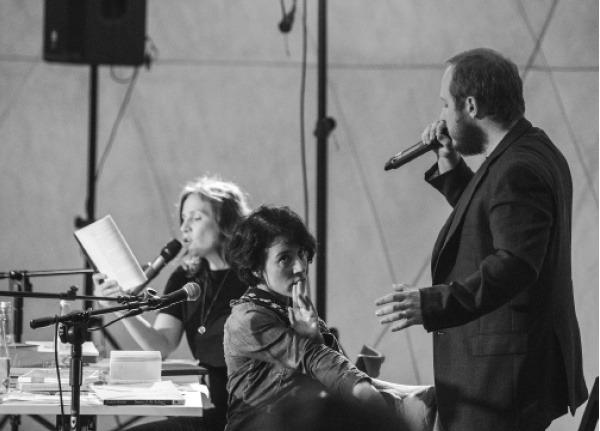
JUDAICA: CONCERT OF FRAGMENTS / OKRUCHY PIEŚNI
first performed on September 15, 2017
White Stork Synagogue, Wrocław, Poland
performed fourteen times in 2017
NAZLIHAN EDA ERÇIN / AGNIESZKA MENDEL / BEN SPATZ
United Kingdom / Turkey / Poland / United States
731370289b731370289e731370289n731370289@731370289u731370289r731370289b731370289a731370289n731370289r731370289e731370289s731370289e731370289a731370289r731370289c731370289h731370289t731370289h731370289e731370289a731370289t731370289e731370289r731370289.731370289c731370289o731370289m
urbanresearchtheater.com
JUDAICA: CONCERT OF FRAGMENTS / OKRUCHY PIEŚNI
NAZLIHAN EDA ERÇIN / AGNIESZKA MENDEL / BEN SPATZ
The goal of the project “Judaica: An Embodied Laboratory for Songwork” was to implement a new kind of theatre laboratory and conduct pure research in a well-defined field of embodied technique. After four months of focused research in northern England, the core trio spent two months traveling to make a series of research presentations across three countries (UK, US, Poland) and three kinds of venue (academic, theatrical, Jewish). For each site we put together a unique combination of performance elements.
At first we had two main strategies for presentation: an “open laboratory” demonstrating the research method and a lecture with video screenings showing the audiovisual outputs we had produced. But no sooner had we begun the research presentation tour than we faced the pull of theatricality—precisely that which the project had intentionally postponed. While the open lab and video screenings were intriguing, people also wanted to hear us sing together the songs we had been working on. There was a need for a concert.
We came up with the idea for a “Concert of Fragments,” in which bits and pieces of song were evoked and explored within an improvised, semi-theatrical event. This format allowed us to present bits and pieces of the core musical dimension of songwork without segregating them from the broader context of movement, interaction, and textuality (following Caroline Gatt’s work on the liveliness of books) that defined our research. The Polish title “Okruchy Pieśni”—literally “Crumbs of Songs”—suggests how diverse melodies and rhythms, as well as words sung in Hebrew, Yiddish, Ladino, Turkish, Luganda and other languages, floated in a web of identities, absences, memories, longings, and actions. For each event, we chose a particular set list of songs, a basic structure around which to weave our songwork.
Each presentation of the “Concert of Fragments” was unique, synthesizing the development of the trio ensemble and our individual processes with specific moments, venues, and audiences. Alongside the open laboratory demonstrations, video screenings, and Q&A sessions, the theatrical concert became a crucial element of our research presentations, helping us further test and understand the limits and powers of performance.